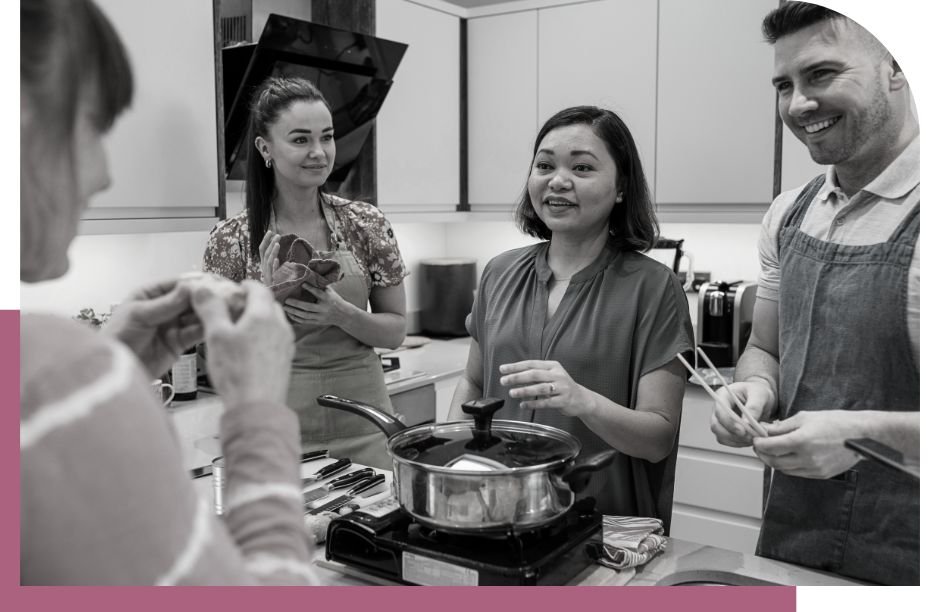10 Essential Life Skills Every Young Adult Should Master Before Leaving Home
Hey there! If you're the parent of an older child or a young adult preparing to leave the nest, you've come to the right place. I'm here to chat with you about something super important: life skills. You know, those things that help us navigate the ups and downs of adulting with grace and, dare I say, style.
Now, you might be thinking, "But, I've got this covered!" or "My kid is a whiz at [insert activity here]." Well, that's fantastic! But let's be honest, we could all use a little extra guidance when it comes to mastering the art of adulting. Trust me, it's not as easy as it looks in the movies.
So, let's dive into the top 10 essential life skills every young adult should have under their belt before they fly solo. We'll explore everything from time management and budgeting to cooking and networking. And hey, even if you're a seasoned adult, there's no shame in brushing up on these skills yourself. After all, adulting is a lifelong journey, and we're all in this together.
So send this article to your kids. I’m going to talk directly to them now.
01 | Time management
Alright, let's kick things off with time management, the secret sauce to conquering adult life. Now, I know what you're thinking: "I've got a million things to do, and there's just not enough time in the day!" Well, buckle up, because I'm about to drop some wisdom on how to get your schedule under control and make the most of your precious time.
Prioritizing tasks and setting realistic goals
First up, let's talk about priorities. You see, time management is all about knowing what's important and tackling those tasks first. Make a list of your to-dos and rank them by importance.
Why? Well, one of the biggest time-wasters is spending too much time on stuff that doesn't help you (Binging TikTok, anyone?). You can avoid this by focusing on the important ones first and saving the less important stuff for later.
And here's a pro tip: be realistic with your goals. Don't expect to become a time management ninja overnight. Baby steps, my friend, baby steps.
Creating schedules and to-do lists
Now that you've got your priorities sorted, it's time to create a schedule or a to-do list. Whether you're a fan of good old-fashioned pen and paper or prefer a fancy digital app, choose a method that works for you. Schedule your tasks, set deadlines, and don't forget to factor in some buffer time for life's little surprises (because let's face it, things rarely go exactly as planned).
Why? Because having this structure and plan in place will help you achieve your goals faster while helping you to stay on track. So make sure to take a few extra minutes each day to review and adjust your schedule accordingly. It won't only save you time in the long run, but it'll also help keep your motivation levels up.
Balancing work, school, and personal life
Ah, the elusive work-life balance. We've all heard of it, but how do we achieve it? Start by setting boundaries and carving out time for the things that matter most. Remember, it's okay to say no sometimes. And don't forget to schedule in some "me time" for relaxation and self-care. After all, you can't conquer the world if you're running on empty. And yes, I'm well aware I just told you to stop wasting your time. The take-away here is to find some balance.
It might take some time (see what I did there?) and practice, but once you've got these skills down, you'll be unstoppable. So go forth, young adult, and conquer your schedule like a pro. And remember, adulting is a team sport, so don't hesitate to ask for help or advice when you need it.
02 | Budgeting and personal finance
Moving on to our next must-have life skill: budgeting and personal finance. Brace yourselves, because we're about to dive into the wonderful world of money management! Now, before you groan and say, "Ugh, numbers!", just hear me out. Mastering your finances is crucial for a successful adult life, and it's not as daunting as it seems. I promise.
Creating and maintaining a budget
Let's talk budgets. Budgeting is simply a plan for how you'll spend your hard-earned cash, and it's easier than you think. Start by listing your monthly income and expenses, then allocate money for each category (like rent, groceries, and fun stuff). And remember, a budget is not set in stone; it's a flexible tool that can (and should) change as your life evolves.
It's also a great way to figure out whether you can actually afford that apartment you have your heart set on. Or that car. Oh yeah. That phone plan too.
Saving money and managing expenses
Now that you've got a budget, it's time to learn the art of saving. You know, that thing you do when you put money aside for a rainy day, a future goal, or an unexpected expense. It's all about living within your means and finding creative ways to cut costs. So, cut out those coupons, explore those thrifty hacks, and watch your savings grow! Your retired self will thank you some day.
Understanding credit and responsible borrowing
You've probably heard of credit cards, loans, and credit scores, right? But what does it all mean? Simply put, credit is a tool that allows you to borrow money and pay it back later (with interest, of course). The key here is responsible borrowing. Pay your bills on time, don't bite off more debt than you can chew, and keep an eye on your credit score.
Why? Because your credit score is a reflection of how you manage your money and it's used by banks, lenders, landlords and potential employers to decide whether or not you are trustworthy.
Sure, budgeting and money management might not be the most glamorous topic, but trust me, your wallet (and your stress levels) will thank you.
03 | Cooking and meal planning
Now, onto one of my personal favorites: cooking and meal planning. Let's face it, we all have to eat, and mastering the art of creating tasty, nutritious meals is a game-changer when it comes to adulting. So, grab your apron, and let's get cooking!
Basic cooking techniques and kitchen safety
First things first, let's cover the basics. Knowing your way around the kitchen is essential, so start by learning some fundamental cooking techniques, like boiling, frying, and sautéing. And don't forget about kitchen safety. Keep those fingers away from sharp knives, and never leave a hot stove unattended. Remember, safety first, culinary masterpieces second, and binging homemade jalapeno poppers third!
Why? Because food.
Planning nutritious, budget-friendly meals
Once you've got the basics down, it's time to plan some meals. Aim for a healthy balance of protein, carbs, and veggies, and don't be afraid to try new recipes or ingredients. And hey, eating well doesn't have to break the bank. Look for seasonal produce, shop sales, and get creative with leftovers (I ate rice with mustard my whole first year of university!). Your body and your wallet will thank you.
Grocery shopping tips and tricks
Last but not least, let's talk grocery shopping. Ah, the joys of navigating crowded aisles and deciphering confusing labels. Fear not, I've got some tips to make the experience a breeze. First, always shop with a list (to avoid impulse buys) and try to stick to the outer edges of the store, where the fresh stuff is usually located. And don't forget to compare prices and check for deals or buy in bulk to save money. Also... bring your own bags.
So go forth, young adult, and embrace your inner chef. Bon appétit!
04 | Laundry and housekeeping
Alright, it's time to tackle a topic that might not be the most exciting, but is oh-so-important: laundry and housekeeping. Yep, you read that right. We're going to discuss how to keep your living space clean, organized, and, most importantly, habitable. Ready? Let's do this! [Insert your favorite pep talk here.]
Doing laundry, including sorting and stain removal
Let's start with laundry, the bane of many young adults' existence. Trust me, it's not as bad as it seems. Start by sorting your clothes into whites, lights, and darks (to avoid those dreaded pink socks). Next, learn some basic stain removal techniques, because life happens and spills are inevitable. And finally, don't forget to clean your lint trap and follow the care instructions on clothing labels. Your clothes will thank you. Wait. Your clothes don't talk to you?! Weird.
Basic cleaning and organization skills
Let's talk cleaning. It's not the most glamorous task, but a clean living space is essential for both your mental and physical well-being. Learn to love (or at least tolerate) your vacuum, mop, and duster, and establish a cleaning routine that works for you. And while you're at it, embrace the art of organization. Trust me, knowing where to find that one important document when you need it is a lifesaver. The trick is to make sure EVERYTHING has a home.
Creating and maintaining a tidy living space
Finally, let's discuss the secret to a tidy living space: maintenance. You see, cleaning and organizing are not one-time events; they're ongoing processes. So, make your bed, do your dishes, and put things away as you go. It might take some getting used to, but the end result is a home you can be proud of (and won't be embarrassed to show off to friends).
And that's your crash course in laundry and housekeeping. Sure, it might not be the most thrilling topic, but it's a vital part of adulting. So conquer your living space with confidence. Cleanliness is next to adulting-ness, after all!
05 | Self-care and mental health
Alright, it's time to discuss a topic that's more serious: self-care and mental well-being. In the whirlwind of responsibilities and challenges that come with adult life, it's essential to take care of yourself, both physically and mentally. So, let's dive in and learn how to be your own best friend!
Recognizing and managing stress
First up, let's talk stress. It's an unavoidable part of life, but learning how to recognize and manage it is crucial for your mental health. Start by identifying your stress triggers and finding healthy ways to cope, like exercise, meditation, or talking to a friend. And remember, it's okay to ask for help when you need it. We all need a little support sometimes.
Setting boundaries and practicing self-compassion
Next, let's discuss the importance of setting boundaries and being kind to yourself. It's essential to know your limits and communicate them clearly to others, whether it's at work, in relationships, or with family. And when things don't go as planned, practice self-compassion. We're all human, and it's okay to make mistakes. Remember, you're a work in progress, just like the rest of us.
Establishing a self-care routine
Self-care. This means taking time out of your busy schedule to nurture your body, mind, and soul. Whether it's a weekly soothing bath, a quiet walk in nature, or simply curling up with a good book in the evening, find activities that bring you joy and help you recharge.
Why? Not taking care of yourself can lead to physical and mental exhaustion. Taking time for yourself gives you the chance to enjoy life, reconnect with your inner self and make sure you are in a good place before tackling your responsibilities.
And don't forget to prioritize sleep and maintain a healthy diet. Your body will thank you.
Prioritize your well-being in the midst of this crazy thing called life. And remember, no one is immune to stress, so don't hesitate to ask for help or advice when you need it.
06 | Communication skills
Okay, it's time to delve into a topic that's absolutely crucial for navigating this wild ride called life: communication skills. Yes, we're talking about the art of effectively expressing ourselves and understanding others. So, let's dive right in and polish up those verbal, non-verbal, and written communication skills. Ready? Let's chat!
Mastering the art of active listening
Believe it or not, being a good listener is just as important as being able to express yourself. So, next time you're engaged in a conversation, resist the urge to interrupt, and give the speaker your full attention. Nod, ask open-ended questions, and paraphrase their words to show you're engaged. Trust me, people will appreciate it.
Pro-tip: Ask everyone you talk to questions about themselves. Not creepy ones like, "What color are your underwear?" but if you try to get to know people by asking questions about their passions, experiences, or beliefs, you'll come off as more interesting and approachable. And people will adore you.
Assertiveness and expressing yourself clearly
Now, let's focus on the other side of the communication coin: expressing yourself. The key here is to be assertive without being aggressive. Clearly state your needs, feelings, and opinions, while respecting the rights and feelings of others. And remember, "I" statements are your friend – they help you take ownership of your feelings without sounding accusatory.
Why? Because when you handle communication with assertiveness, it's more likely to bring about a win-win situation where both parties feel respected and understood. Plus, it helps build relationships, improve self-esteem and lead to better outcomes in the future.
Decoding and using non-verbal cues
Alright, let's tackle the mysterious, sometimes alien, world of non-verbal communication. Did you know that a whopping 55% of communication is conveyed through body language? Yep, it's true! It's almost 100% if you're a fish. So, pay attention to facial expressions, gestures, and posture when interacting with others. And be mindful of your own non-verbal cues as well – they can speak volumes without you even realizing it.
Polishing your written communication skills
Finally, let's discuss the ever-important skill of written communication. In this digital age, being able to clearly convey your thoughts in writing is more important than ever. So, brush up on your grammar, punctuation, and spelling, and always proofread your messages before hitting send. And when it comes to tone, remember that sarcasm and humor can easily be misinterpreted in writing, so tread carefully.
Context is everything here. If you're texting a friend, go ahead and speak in acronyms and emojis. But, if you're writing something that will be public, or is intended to be read by someone you wouldn't invite over for a slumber party, use full sentences.
Once you learn these skills, you'll be well-equipped to connect with others, both personally and professionally.
07 | Problem solving and critical thinking
Okay, here's another life skill that will undoubtedly come in handy throughout your adult life: problem-solving and critical thinking. These essential skills will not only help you navigate tricky situations but also empower you to make well-informed decisions.
Identifying problems and analyzing situations
First things first, let's talk about the art of spotting problems and analyzing situations. When faced with a challenge, start by asking yourself questions like, "What's the root cause of this issue?" and "What are the potential consequences of my actions?" This will help you get a clear picture of the situation and allow you to tackle it head-on.
Generating creative solutions and weighing options
Once you've analyzed the problem, it's time to brainstorm some solutions. Don't be afraid to think outside the box and consider unconventional approaches. Once you have a list of potential solutions, weigh the pros and cons of each to determine the best course of action.
Implementing solutions and learning from mistakes
Finally, put your chosen solution into action. This might involve some trial and error, but that's okay! Embrace the learning process and be prepared to adapt and adjust as needed. And most importantly, don't be afraid to learn from your mistakes. Every misstep is an opportunity for growth and self-improvement.
Armed with these skills, you'll be well-equipped to tackle any challenge that comes your way. With a little creativity and perseverance, you'll become an avid problem-solver.
08 | Networking and building connections
Get ready to flex those social muscles, because our next topic is all about networking and relationship building. Yes, we're diving into the art of making connections, both personally and professionally. So let's get started, and remember, it's not just about what you know, but who you know. How cliché.
Building and maintaining friendships
First up, let's talk friendships. Strong social connections are essential for your well-being, so it's important to invest time and energy into nurturing them. Be open to meeting new people, be a good listener, and remember that friendships are a two-way street. Oh, and don't forget to check in on your pals and be there for them when they need you. Friends are the family we choose, after all.
Mastering the art of small talk
Sometimes, you're going to have to talk to strangers and acquaintances. This brings us to the often-dreaded small talk. It might seem trivial, but being able to chat casually with strangers is a valuable skill. So, next time you're at a party or waiting in line, strike up a conversation with someone new. Ask open-ended questions, listen actively, and remember that people love to talk about themselves. Who knows? You might just make a new friend or valuable connection.
Networking for professional growth
Finally, let's discuss networking in a professional context. Networking is all about building relationships that can help you advance your career. Attend industry events, join online forums, and don't be afraid to reach out to potential mentors or colleagues. And remember, networking is not just about taking; it's also about giving. Offer your expertise, support, and connections when you can.
Start making connections that will enrich your life and help you achieve your goals. Networking and adulting go hand in hand, so embrace your inner social butterfly and soar!
09 | Navigating public transportation and travel
Alright, it's time to tackle a topic that's sure to come in handy as you explore the world around you: navigating public transportation and travel. Yep, we're going to learn how to conquer buses, trains, and planes like a seasoned globetrotter. So, grab your trusty travel bag, and let's get ready to embark on a journey of discovery and adventure!
Mastering local public transportation
First things first, let's talk about conquering your local public transportation system. Whether it's buses, trains, or trams, familiarize yourself with schedules, routes, and fare options.
Why? Knowing the ins and outs of your transportation system will give you the freedom to get from point A to B without relying on others or having to ask for help. This can be especially important if you are living in a foreign country, where language barriers can present an extra challenge.
Don't be afraid to ask fellow commuters or transit staff for help – they're usually more than happy to assist. And, of course, always remember your manners and practice good transit etiquette. Nobody likes a seat hog!
Venturing out on regional and national rail
Ready to spread your wings and explore a bit further afield? Let's talk about regional and national rail travel. Research different train companies, ticket types, and booking options to find the best deals. And remember, the early bird catches the worm – booking in advance can save you a pretty penny. Oh, and don't forget to pack some snacks and entertainment for those long journeys. Trust me on this. Train food can be... um... yucky.
Soaring through the skies (aka air travel)
Now that you've conquered land-based travel, let's take to the skies. Navigating airports and air travel can be a little overwhelming, but fear not – with a little preparation, you'll be breezing through security like a pro.
Make sure to arrive early, have your travel documents handy, and follow all security guidelines. Signs are posted everywhere in airports. And don't forget to always read the fine print when you are buying tickets. Stay calm and patient, even when faced with delays and long lines. After all, you're about to embark on an amazing adventure. Unless you're travelling for work, of course.
Planning and budgeting for travel
Finally, let's discuss the nitty-gritty of travel planning and budgeting. Start by setting a realistic travel budget that includes transportation, accommodations, meals, activities, and souvenirs. Then, do your research to find the best deals and options to stretch your travel dollars further. And don't forget to factor in some wiggle room for those unexpected expenses – because, let's be honest, travel rarely goes exactly as planned.
With these skills in your adulting toolkit, you'll be well on your way to exploring the world and expanding your horizons.
10 | Goal setting and personal development
Alright, it's time to tackle a topic that's near and dear to every self-improvement aficionado's heart: goal setting and personal development. That's right, you need to learn how to set meaningful goals so you can embark on your own journey of self-discovery and growth. Get ready to unlock your potential.
Setting SMART goals
First up, let's talk about setting goals the SMART way. No, I don't mean by using a fancy gadget or app – I'm talking about setting Specific, Measurable, Achievable, Relevant, and Time-bound goals.
Why? Because SMART goals allow you to break down your grand plans into smaller manageable tasks that can be accomplished over time. Each goal should have a clear target, timeline, and measurable outcome so you know when it has been achieved. This helps keep you on track and motivated to continue working towards your goals. Say goodbye to vague resolutions and hello to concrete, actionable goals.
Breaking goals down into manageable steps
Once you've got your SMART goals in place, break them down into bite-sized, manageable steps. Think of it like climbing a mountain – you wouldn't try to leap to the summit in one bound, would you? If you can, please teach me your ways! By breaking your goals down into smaller tasks, you'll make the journey less daunting and you can celebrate small victories along the way.
Embracing personal development and self-reflection
Next, let's discuss the importance of personal development and self-reflection. Regularly taking the time to assess your strengths, weaknesses, and areas for growth is key to becoming the best version of yourself. So, get cozy with a journal, meditate, or chat with a trusted friend – whatever helps you tap into your inner thoughts and feelings. Self-awareness is the first step to growth.
Staying motivated and accountable
Finally, let's talk about staying motivated and accountable on your personal development journey. Surround yourself with positive influences, whether that's friends, family, or an online community of like-minded goal setters. And don't forget to reward yourself for milestones reached along the way. And when setbacks happen (because, let's be honest, they will), remind yourself of your "why" and keep pushing forward.
With these tools in your adulting arsenal, you'll be well on your way to achieving your dreams and becoming the person you've always wanted to be. So go forth, young adult, and embrace the adventure that lies ahead. It's time to show the world what you're made of and live your best life. The future is yours for the taking – now go out there and make it count!
Have you started envisioning your best life but need support to make it happen? The Life Journey Membership is your key to ongoing growth and fulfillment. Gain exclusive access to a growing library of resources tailored to enhance every area of your life—or as we like to call them, journeys. From challenges that motivate you to mini-courses that enlighten, along with practical templates, workbooks, and eBooks, this membership is designed to support you as you craft your dream life.


























Discover the six common barriers that may be holding you back from achieving financial wellness and learn practical tips to overcome each challenge. Whether you're overwhelmed by the complexity of financial planning or procrastinating on money matters, this guide is your first step towards a more secure and prosperous financial future.